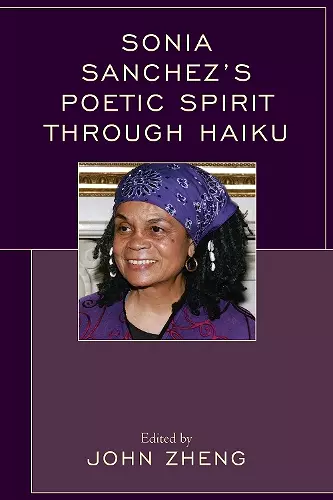Sonia Sanchez's Poetic Spirit through Haiku
Format:Paperback
Publisher:Lexington Books
Published:11th Feb '20
Currently unavailable, and unfortunately no date known when it will be back
This paperback is available in another edition too:
- Hardback£95.00(9781498543323)

This collection of ten critical essays is the first scholarly criticism of haiku by Sonia Sanchez, who has exemplified herself for six decades as a major figure in the Black Arts Movement, a central activist in civil rights and women’s movements, and an internationally-known writer in American literature. Sanchez’s haiku, as an integral and prominent part of contemporary African American poetry, have expressed not only her ideas of nature, beauty, and harmony but also her aesthetic experience of music, culture, and love. Aesthetically, this experience reflects a poetic mind which has helped the poet to shape or reimage her poetic spirit.
These ten essays, starting with Zheng's excellent introduction, trace the influence of haiku on African American poetry from 1923 and the Harlem Renaissance through the Black Arts Movement of the 1960s to the present. The book is rich in scholarship, and examples demonstrate how haiku has enriched African American poetry. Though the essays focus on poet Sonia Sanchez (b. 1934), they also provide a literary history of black poetry—a poetry of protest, identification, and pride. Among the primary practitioners discussed are Langston Hughes, Richard Wright, and James Emanuel, all whom influenced Sanchez. Sanchez has produced haiku-like poems all her writing life without following the “rules” of the form. Her first haiku appeared in Love Poems (1973). Each essay acknowledges how Sanchez utilized and shifted the dimensions of the form, along with related forms, sonku and tanka, for her socially conscious art. Though Sanchez is primarily known as an activist poet, her more recent haiku sequences in Morning Haiku (2010) include love poetry and blues poems. Readers interested in Sanchez should also read Joyce A. Joyce's Ijala: Sonia Sanchez and the African Poetic Tradition (1996) and Conversations with Sonia Sanchez (2007), which Joyce edited. Summing Up: Recommended. Upper-division undergraduates and above. * CHOICE *
Sonia Sanchez's Poetic Spirit Through Haiku explores how Sonia Sanchez used haiku to empower her voice within the Black Arts Movement. The volume’s editor John Zheng explains that Sanchez expressed herself as “a protest poet, a fighter, and a revolutionary” through haiku, a poetic form that originated as Japanese court poetry. Zheng notes that Sanchez, like Richard Wright, embraced haiku as a comfortable, familiar poetic structure. John Zheng’s pioneering work on haiku in Richard Wright in his earlier book The Other World of Richard Wright: Perspectives on His Haiku and this fine work on Sonia Sanchez offers the reader a fascinating new perspective on both writers. -- William Ferris, University of North Carolina at Chapel Hill, author of Give My Poor Heart Ease: Voices of the Mississippi Blues
Professor John Zheng (Mississippi Valley State University) has assembled a powerful and convincing store of essays which should cement Sanchez’s place among contemporary American letters. . . . this book serves a number of worthwhile purposes: to introduce Sanchez to a wider audience (although she has won some pretty big prizes, including an American Book Award), to widen the discussion regarding haiku and its possibilities, and to remind us of the importance and beauty of the Black Arts Movement. * Arkansas Review *
This really captures the essence of the issue that many readers of Western haiku will take with Sanchez’s haiku. If she refuses to follow tradition, if her poems lack the core elements that make up a haiku, is it even appropriate to label these poems as haiku or to study them as haiku? Are these merely three line poems or stanzas, and would it be better to analyze the poems from that lens instead? The authors of these chapters seem to all agree that these are haiku, and contain enough comparison to Western haiku that they should be studied through that lens. They do a solid job looking at how Sanchez connects with current haiku theory and how she departs from it to create her own unique voice within the form of haiku. They also offer various lenses through which to analyze her haiku, providing unique insight into the language and themes of her work. Overall, this is an impressive collection of scholarship focused on one of the more unique voices in American haiku. * Juxta *
John Zheng has assembled a distinguished group of contributors to study Sonia Sanchez's haiku in a volume that needs to be read and savored. The essays, plus Zheng's masterful introduction and own contribution, discuss such powerful topics as the origins and development of the African American haiku, racial memory and representation in Sanchez's haiku, and the way she was influenced by and incorporates the blues, civil rights, and ethnographic celebration into her poems. Zheng and his contributors deserve kudos for building bridges between ancient poetic traditions and one of the today's most prolific and gifted African American poets. -- Philip C. Kolin, University of Southern Mississippi
ISBN: 9781498543347
Dimensions: 224mm x 153mm x 15mm
Weight: 322g
210 pages